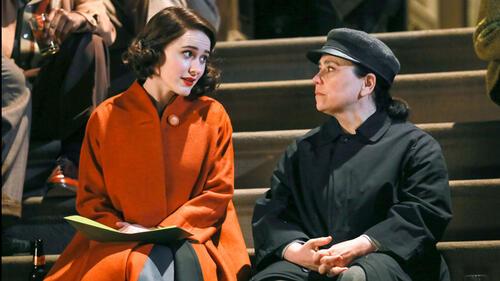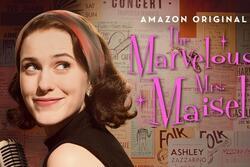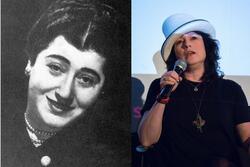Review: "Mrs. Maisel" Season 3
Spoilers ahead.
In the fifth episode of the most recent season of The Marvelous Mrs. Maisel, entitled “It’s Cabbage or Comedy,” Midge and crew are in Miami staying at the Fontainebleau Hotel. Viewers are treated to scene after scene of white architecture, crystal chandeliers, and swaying palms against the backdrop of a true blue ocean. Lenny Bruce appears, as if by magic—he’s living out of a motel room, filming spots on a fictional show called Miami After Dark. He and Midge have circled each other in the comedy world, but dinner and dancing brings them to the brink of exploring their sexual tension, which has built steadily over two and a half seasons. They return to his room and linger in the doorway, where Midge tells him (after a long pause) that she’s getting a cab. It’s understood that despite mutual attraction, they are colleagues first—the disruption of their work dynamic (especially given that Lenny Bruce was a real person) would spoil the relationship. As she leaves, Lenny implores her, gently, to consider him “before he’s dead.” She agrees that it’s a date. And the screen fades to black.
As “Dedicated to the One I Love” by the Mamas and the Papas started playing over the credits, I realized that I had been holding my breath for much of the final scene. The episode incorporates everything that drew me into the Maisel universe in the first place: impeccable attention to period details, believable chemistry between actors, and beautiful set design. On the whole, Maisel is a show where people get happy endings. But it’s a delicate balancing act between feeling uplifted and feeling overwhelmed by relentless cheer. The New Yorker’s Emily Nussbaum has called The Marvelous Mrs. Maisel “treacly and exhausting” and even “tooth-rottingly twee.” There is nothing wrong with the escape that the pink and frosted fantasy world of Maisel offers. But the question, for me, is whether that fantasy is built on a solid foundation. “It’s Cabbage or Comedy” certainly is: Midge and Lenny are dynamic scene partners, the dialogue is witty and quick, and each plot point moves forward in a way that feels both organic and true to the characters.
But this midpoint episode is, frustratingly, an anomaly when juxtaposed with the rest of the season. In January 2019, I reviewed the second season of Mrs. Maisel for JWA; in my reflection, I expressed disappointment with how low the stakes appeared to be for Midge as she got her fledgling comedy career off the ground. She could afford to take two months off to travel the Catskills, she seemingly had zero obligation to care for her children, and her ex-husband remained, almost pathetically, devoted to both her AND her success on stage. The depiction of her romantic prospects was the source of most of my griping—I have maintained since the show’s debut that Midge is at her most interesting when she is working with Susie and not concerned with the men that surround her. At the end of season two, she accepts Shy Baldwin’s tour offer, breaks off an intended engagement with a doctor she met in the Catskills named Benjamin, and initiates a one-night stand with Joel, her ex-husband. She is transparent with Joel that this is a final hurrah—she’s going to do this comedy thing for real, and for her, that means a little solitude.
At the beginning of season three, Joel is very much still in the picture. He’s trying to be a full-time parent, while also getting his new comedy club in Chinatown open for business. Benjamin is only mentioned in passing, until Midge’s mother gets it into her head that she has potential as a matchmaker. This leads to Rose awkwardly stopping by the hospital where Benjamin works to try to set him up with other single Jewish women in the area. It isn’t until the end of the season that Midge and Benjamin speak face-to-face, and little is resolved. The audience is informed that Midge broke off their engagement via letter, but is never given a sufficient explanation why. Even as they argue it out on screen, the reasoning isn’t clear. Their breakup doesn’t bother me—I never saw real chemistry between the two of them—but the confrontation and resolution happens in such a shoehorned manner that I wonder if it was worth including in the first place. What’s more, Midge and Joel get remarried in Vegas after a drunken night together, an event that seems pretty important, but is barely discussed during the rest of the season.
This underscores two of my biggest problems with the third season: continuity and pacing. Large plot points are introduced and then either tossed out or glossed over without a second thought. Out-of-character decisions are made by people whose established personalities and mannerisms are haphazardly changed to convenience the plot (Midge’s father, Abe, quits both of his jobs and invites dozens of beatniks into the apartment, with no explanation given until several episodes later; Midge’s parents move in with their daughter’s former in-laws, whom they cannot stand, because apparently there was no other way to get all the secondary characters on screen together). This season also sees the cast split up because Midge and Susie are on the road, making the already jumbled episodes even more fractured. It feels strange to spend so much time cutting away from Midge to watch Abe and Rose bicker with Moishe and Shirley, with little plot progression to show for it.
And where is Midge in all this? She’s keeping herself afloat—learning the rules of the road and finding her footing with Shy Baldwin and his touring band. She and Susie have a brief spat at the onset of the season over Susie’s decision to manage her vocal rival, Sophie Lennon. But the show can’t keep them fighting for long, and this is resolved relatively painlessly as Midge reflects and recognizes that Susie can’t survive on ten percent of her earnings alone. However, as the season continues, Midge begins to struggle in a way that viewers haven’t previously seen, and we start to see the more unsavory sides of her personality and privileged upbringing.
I might be alone in this, but I was relieved to see her stumbles and downright unlikability explored more deeply. In episode seven, “Marvelous Radio,” Midge agrees to do a Phyllis Schlafly radio promotion without doing any research whatsoever and is rightfully shamed by her father. She flubs the gig on purpose because she realizes that whatever she’d be paid for the spot isn’t worth promoting antisemitism. When she is ultimately kicked off of Shy’s tour for coming dangerously close to outing him onstage at the Apollo (a venue she never should have been performing at in the first place, as Moms Mabley’s manager tells her) it feels…right.
Midge has, until this point, faced few consequences for rushing into things without thinking, trusting in her wealth, white skin, and beauty to propel her where she needs to go. From the first season, Maisel has faced backlash from critics for its failure to address the hurdles faced by comics of color during the mid-20th century (with very few people of color shown on screen to begin with). In this season, the show still avoids the tough realities of 1960 (it is only in passing that Shy alerts Midge to the fact that he, along with all his Black band members, have been staying at different hotels than she has throughout the entire tour), but what is shown reflects poorly on Midge—with good reason. It is her ignorance that gets her fired from Shy’s tour, and I am hopeful that the showrunners don’t give her an easy on-ramp back into his good graces in season four.
With the exception of the bris in episode seven (a scene I did laugh out loud at—especially when Joel places a bet with his father over which goy in the room will faint) Maisel is far less Jewish in season three than in season two—something that felt natural given that much of Midge’s time is spent on the road and away from her family. However, as in previous seasons, Moishe and Shirley in particular fall victim to the worst stereotypes about Jewish parents. Many thousands of words have been written by dozens of critics about whether the Jewishness of Maisel is harmful or helpful, but I’d like to propose another question: Is it sustainable? There will always be a High Holiday to force the characters to celebrate, but I can only stand to listen to the show’s increasingly shrill rat-a-tat dialogue about brisket so many times.
The show has officially been renewed for a fourth season, and I have no idea where the Sherman-Palladinos are planning to take the Maisel ensemble next (though I do have one plea to shout into the void: Please do not have Midge end up with Joel again). I keep tuning in to watch Maisel because the first season scratched an itch I didn’t know I had when it debuted. I watch because at its best, Midge speaks directly to the part of me that wants to have the perfect retort ready on stage in front of a crowd, making my voice heard while I’m dressed to the nines. But growth happens in the moments when we are uncomfortable. Right now, Midge is in a very uncomfortable place, with her future uncertain. The stage is set for some intense character growth, and I am hopeful she rises to the occasion.









I enjoyed reading your review, but I have a couple of different thoughts. My daughter, who is in her 30’s compared Mrs. Maisel to Marjorie Morningstar, one of our joint favorite characters. I am surprised others haven't’ seen that. Also, I thought the addition in this season of Midge’s Mom confronting her all male and BOY family foundation was very interesting. Her rejection of them was a step forward in her own life. I also believe that the addition of her parents having more of a voice was a plus for the series. I agree with you about Joel, time to give that up. In short, I thought the third season was definitely the best, and am sorry there are so few episodes.